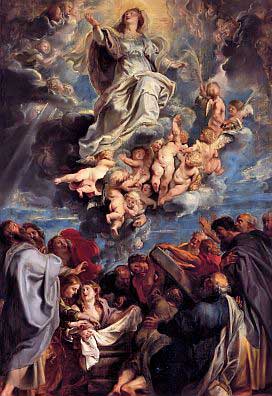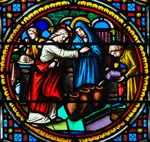A PRAYER BY ALPHONSUS LIGUORI ABOUT THE ASSUMPTION OF MARY

THE FIVE FIRST SATURDAYS IS A DEVOTION NEEDED NOW MORE THAN EVER! FIND OUT MORE HERE
THE SAINT MICHAEL PRAYER AND THE ROSARY
ARE ALSO POWERFUL PRAYERS TO HELP US THROUGH THESE VERY TURBULENT TIMES!
HIGHLY RECOMMENDED! DELIVERANCE PRAYERS,
A BOOK FROM SENSUS TRADITIONIS PRESS
(A GREAT PUBLISHER HELPING US FIGHT OUR MANY SPIRITUAL BATTLES NOWADAYS)!
CHECK OUT OUR PODCAST PAGE AND OUR YOUTUBE CHANNEL FOR INSPIRING CONTENT
THIS WEBPAGE IS ALSO AVAILABLE
AS A PODCAST HERE
This prayer about the Assumption of Mary below comes from The Glories of Mary, a book written by the great 18th century Doctor of the Church St. Alphonsus Liguori, in which he pays tribute to Our Lady in learned discourses and meditations on various aspects of her life.
It reminds us all that Mary’s Assumption into heaven by no means meant that she would somehow cease to exist! Just as Christ is with us in the Eucharist as we await His Second Coming someday, his Blessed Mother is with us as well.
She has appeared in numerous church approved Apparitions over the centuries pleading with us to follow her son in loving obedience; and otherwise giving the faithful much needed strength and grace.
As we pray in the Hail Mary, the staple of that powerful prayer, the Rosary, “Holy Mary, Mother of God, pray for us sinners, now and at the hour of our death, Amen”. Note we do not worship Mary, we honor her, so that we may worship her Divine Son Jesus more lovingly and more fruitfully as needed.
Although it is not covered specifically in scripture, nonetheless in keeping with the Church’s magisterial teachings, Mary’s Assumption into Heaven at the end of her life was proclaimed as a dogma of our faith by Pope Pius XII on November 1, 1950.
The prayer itself follows. You may notice, in its supplications to Our Lady for her heavenly assistance in our journey towards sanctity and Eternal Life, that it resonates with another better known prayer the Salve Regina (Hail Holy Queen). Only in this case, we are poor children of Adam rather than banished children of Eve.
Oh, our most sweet Lady and Mother, thou hast already left the earth, and hast reached the kingdom, where thou sittest as queen over all the choirs of angels, as the holy Church sings: She was exalted about the choirs of angels in the celestial kingdoms : "Exaltata est super chores angelorum ad coelestia regna." We know that we sinners are not worthy of having thee with us in the valley of darkness. But we know also, that thou in thy grandeur hast never forgotten us in our misery, and by being exalted to such glory hast never lost compassion for us poor children of Adam, but rather that it is increased in thee. From the high throne then, where thou dost reign, turn, oh Mary, even upon us, thy pitying eyes, and take compassion upon us.
Remember, too, that on leaving this world, thou didst promise not to forget us. Look upon us and succor us. See in what tempests and in how many dangers we are, and always shall be, till the end of our life arrives. By the merits of thy holy death, obtain for us holy perseverance in the divine friendship, that we may finally depart from this life in the grace of God, and thus come one day to kiss thy feet in paradise, and unite ourselves with the blessed spirits in praising thee, and singing thy glories, as thou dost merit. Amen.
St. Alphonsus himself gives us is these inspiring insights, words that reinforce the supplications given to our Lady in this prayer as He writes:
The end of the life of Mary having now arrived, there was heard, as St. Jerome relates, in the apartment where she lay, a great harmony; and also, as it was revealed to St. Bridget, a great brightness was seen. By this harmony and unusual splendor the holy Apostles perceived that Mary was then departing, at which they broke forth again in tears and prayers, and raising their hands, with one voice exclaimed: Oh, our mother, now thou art going to heaven, and art leaving us, give us thy last benediction, and do not forget us in our misery. And Mary, turning her eyes around upon them all, as if bidding them for the last time farewell, said: Adieu, my children: I bless you; do not fear that I shall forget you.
In focusing on Mary’s Assumption what is intriguing is that, as mentioned earlier, while there are no direct references to this Blessed event in scripture, we have some inspiring insights about it in Raphael Brown’s book The Life of Mary as Seen by the Mystics in which he weaves together various church approved private revelations about our Lady.
Intriguingly, from Brown’s account, we read that Our Blessed Mother directly chose to help the apostles and disciples with their various concerns and needs in establishing the new fledgling church rather than residing in heaven with her Divine Son shortly after his Ascension.
Having been Immaculately Conceived without Original Sin, Mary was wholly motivated to help people draw closer to God. One can well imagine her looking at the apostles and disciples after our Lord’s Ascension with empathy, knowing they could use her support.
Sure, if she had been like so many of us fallen creatures, she might have just wanted to sit on a lofty heavenly throne and look down on us with a mixture of interest and disdain; as if humanity was just not worth the effort that would be needed to help her Divine Son’s church to grow and flourish.
Now, of course, Saints Peter and Paul were instrumental in the spread of Christianity in a number of regions in the Roman Empire. Nonetheless, according to the private revelations in Raphael Brown’s book, our Blessed Mother was very much involved as well, giving advice and encouragement to the apostles and disciples for a number of years before her Assumption into Heaven.
A wonderful Marian hymn describes Mary as “the queen who decks her subjects with the light of God's own grace”. And we see our Blessed Mother in numerous apparitions imploring and pleading with us, as she told the waiters at the wedding feast at Cana to “do whatever He (that is to say, Jesus) tells you” (John 2:5).
It records Lord's first miracle in John's gospel when, in obedience to his Blessed Mother, he thought water into wine when the wine had run out at this reception. Remember as well that Mary became our Blessed Mother as well as saint John’s by extension, according to the Church’s Magisterial teachings, when Jesus said to both of them at His Crucifixion “Woman, behold your son. Son, behold your mother” (John 19:26-27).
Keep in mind also that our great Queen of Heaven has appeared to numerous people over the centuries in apparitions, as mentioned earlier, in various places around the world. The most famous of these include her appearances as Our Lady of Guadalupe in 1531 and as Our Lady of Fatima in 1917.
Thus, she is certainly an intercessor and by no means an interloper for her son. Asking for help and assistance which we very desperately need, especially nowadays, should not be considered idolatry in any way, as some Christians mistakenly believe. Nothing can be further from the truth!
Hopefully this prayer from Saint Alphonsus printed above can inspire you to reach out to her for her maternal assistance with getting into Heaven and avoiding Hell. And as we say in the wonderful Miraculous Medal Prayer "O Mary conceived without sin pray for us to have recourse to thee."
I’ll leave it to St. Alphonsus to have the last word here. As he wrote in The Glories of Mary:
Let us rejoice, then, with Mary, in the exalted throne to which God has elevated her in heaven. And let us rejoice also for our own sake, since if our mother has ceased to be present with us, by ascending in glory to heaven, she has not ceased to be present with us in her affection. Nay, being there nearer and more united to God, she better knows our miseries, and therefore pities them more, and is better able to relieve us.
To which I may add Amen!!
God Bless,
Christopher Castagnoli
for www.ourcatholicprayers.com
FROM OUR BOOK AND GIFT STORE
OR CAFE PRESS STORE!
Return from A Prayer by Alphonsus Liguori on the Assumption of Mary to Prayer Blog Page














